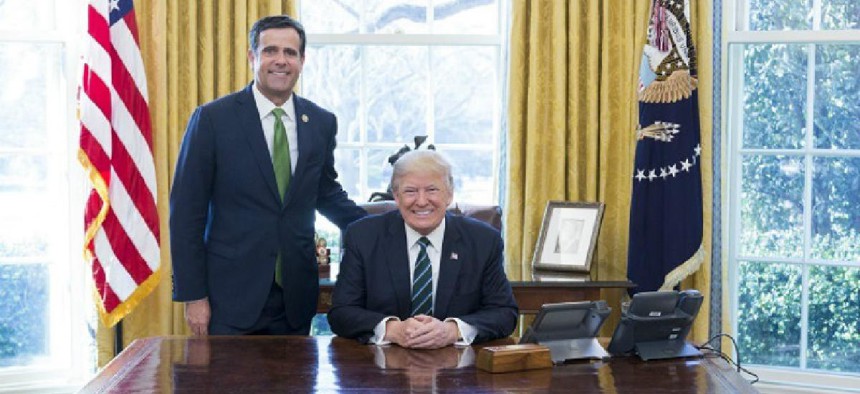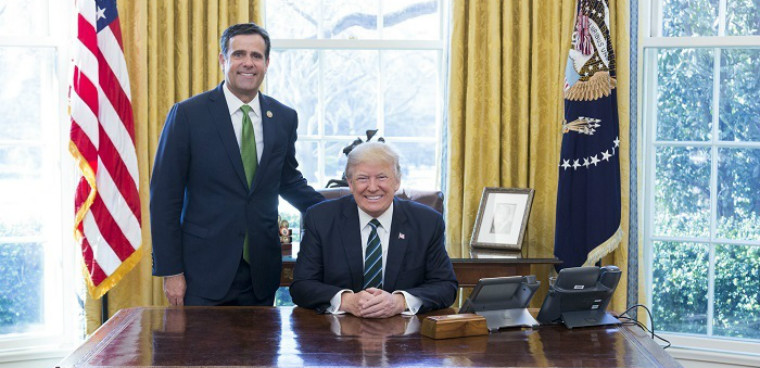Trump's pick for DNI has long cyber record

Rep. John Ratcliffe (R-Texas), President Trump's pick for Director of National Intelligence, sponsored cybersecurity legislation from his perch at the Homeland Security Committee.

Rep. John Ratcliffe (R-Texas) poses with President Trump in the Oval Office. (Official White House photo)
The Trump administration is set to replace outgoing Director of National Intelligence Dan Coats with a three-term member of Congress who sits on the House committees on homeland security, judiciary and intelligence.
In a late-night Sunday tweet, President Donald Trump announced that Coats would be resigning his office Aug. 15 and Rep. John Ratcliffe (R-Texas) will be nominated to take his place. In a resignation letter dated July 28, Coats thanked Trump for the opportunity to serve and listed a handful of his proudest accomplishments during his tenure, including the creation earlier this month of a new position to coordinate election security efforts across the broader intelligence community.
Ratcliffe, who must first successfully navigate the nomination process in the Senate, has no background in intelligence or diplomacy. Critics contend that his nomination may have more to do with his fiery performance defending Trump in a series of congressional hearings, where he frequently criticized the conduct of intelligence agencies, than his qualifications.
However, he does sit on three House committees that focus on intelligence and national security issues (Homeland Security, Intelligence and Judiciary) and has a legislative background in cybersecurity policy. As a member of the House Homeland Security Committee, and chair of its cyber subcommittee, he has run oversight hearings on DHS' cybersecurity mission and the effectiveness of the Continuous Diagnostics and Mitigation (CDM) program.
In 2017, he called the cybersecurity posture of the United States "the defining public policy challenge of our generation" and was an early supporter of legislative reforms that eventually wound up establishing the Cybersecurity and Infrastructure Security Agency at DHS.
He authored legislation to codify the CDM program into the 2002 Homeland Security Act that passed the House in 2018, and this year he teamed up with Reps. Michael McCaul (R-Texas), Jim Langevin (D-R.I.), John Katko (R-N.Y.) and Dutch Ruppersberger (D-Md.) to sponsor a bill that would codify cyber incident response teams within DHS that passed the House and is awaiting action by the Senate
"President Trump's call to serve in this role was not one I could ignore, and I am incredibly thankful to him for this great honor," Ratcliffe said in a statement. "I look forward to my new role with energy and focus."
Ratcliffe has also proven to be a stalwart defender of Trump's priorities in Congress, especially during the two-year-long investigation by Special Counsel Robert Mueller on Russian interference during the 2016 election that also looked into a possible conspiracy between Russia and the Trump campaign.
In a statement, Sen. Richard Burr (R-N.C.) chair of the Senate Intelligence Committee, praised Coats' tenure as DNI, which he claimed led to "significant progress in addressing the shortcomings that left us vulnerable to foreign interference in our elections."
Burr said he had already spoken with Ratcliffe to congratulate him on his nomination and pledged that when the White House sends in a formal nomination he "will work to move it swiftly through regular order." Notably, he said he was looking forward to working with ODNI Principal Deputy Director Sue Gordon, who by federal law would be next in line to take over as acting DNI. In his tweets announcing the move, Trump did not mention Gordon, only saying "the acting director will be named shortly."
Earlier this year, the administration faced a similar scenario when DHS Secretary Kirstjen Nielsen was forced out, leaving acting Deputy Secretary Claire Grady as the legally designated acting replacement, but Trump instead said he was appointing then-Customs and Border Protection Commissioner Kevin McAleenan to the post. Grady eventually resigned her post in April.


